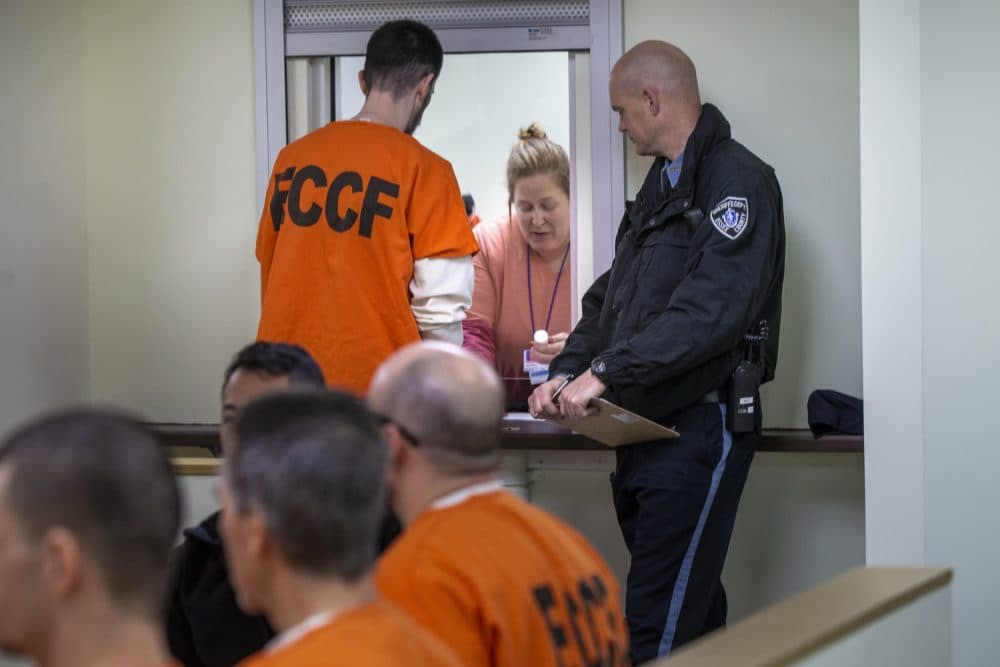Advertisement
Mass. Prisons And Jails Among Hardest Hit By Coronavirus In U.S.
Five Massachusetts correctional institutions appear to be among the hardest hit by coronavirus infections among inmates and staff thus far at the roughly 4,900 jails and prisons in the United States.
Those include the Shirley, Framingham and Bridgewater state prisons, as well as the Essex and Middlesex county jails, according to data compiled by WBUR from local, state and federal government websites and media reports.
This is a snapshot in time amid a fast-moving pandemic, as the number of infected inmates, corrections officers and medical staff jumps by the day. As of Tuesday, WBUR found the coronavirus has infected nearly 15,000 inmates and corrections workers nationally and has killed more than 130.
"We're really just at the early stages of seeing how bad it is behind bars," said Dr. Homer Venters, a former chief medical officer for the New York City jail system.
This is almost certainly an undercount, as the reporting of infections and deaths from COVID-19 has been scattershot across the country. And while some jails and prisons have taken to broad testing of their populations, others are doing no testing at all.
Reports On Virus' Spread In Prisons And Jails Are Inconsistent
In Massachusetts, the medium-security prison in Shirley this week shot to the top of the state's rankings, with 121 positive cases — 106 inmates and 15 staff members — after mobile testing identified dozens of new inmates who had not been showing symptoms of the virus.
The state Department of Correction also reported Tuesday 84 cases at the women's prison in Framingham, 70 of those inmates. The Massachusetts Treatment Center in Bridgewater had 59 total.
This is a snapshot in time amid a fast-moving pandemic, as the number of infected inmates, corrections officers and medical staff jumps by the day.
The Essex county jail in Middleton reported 67 inmates and staff infected with the virus, and the Middlesex county jail in Billerica had 66, according to court reports on Tuesday.
Nationally, the numbers are exploding. Jails and prisons in Ohio, New York, Arkansas and Michigan have seen the virus spread by hundreds overnight in some cases. Ohio’s Marion Correctional Institution is at the top of the list nationally, with nearly 2,200 infections among inmates and staff. The vast majority of the prison's inmates have tested positive.
Outbreaks at some institutions have quickly turned deadly. The Pickaway Correctional Institution in Ohio, not far from Columbus, has reported 14 deaths.
The Massachusetts Treatment Center in Bridgewater — a state prison that detains men deemed sexually dangerous — has reported five deaths. Two prisoners have died at MCI-Shirley.
Public officials have been girding for the spread of the coronavirus in U.S. jails and prisons, because inmates live in tight quarters where it's hard to enforce cleaning and social distancing. Yet the reporting of the virus' spread in these facilities, which house more than 2 million people, has been inconsistent at best.
State corrections officials in Michigan, Texas and Ohio are updating numbers daily on public websites, while jails in some parts of the country are releasing little information at all. In many places, the only way to know how many inmates and workers are affected is through news reports.
For instance, the Miami Herald discovered that 159 inmates at the Metro West Detention Center, and 16 staffers, had tested positive, only after inmates filed a lawsuit.
Gov. Charlie Baker has said little about the way Massachusetts is handling the pandemic behind bars, except to note that corrections officials are following state and federal health guidelines.
In response to why MTC has had five deaths, Baker said the average inmate age there is older than the rest of the state’s prison population.
“The other thing I would say is I think people did a lot of really good work there,” he said at a press conference Monday. “But that’s a much tougher building, given the way it’s laid out and the way it’s organized, than some of the other ones that exist in our existing correctional system.”
In Massachusetts, the state’s Supreme Judicial Court is now requiring jails and prisons to report the number of inmates and staff they are testing, as well as how many are infected.
Most Massachusetts facilities are only testing detainees who show symptoms of the virus. The Barnstable county jail hasn't tested a single inmate since early April and Franklin has only tested two, based on the latest weekly report to the court.
Meanwhile, stepped-up testing in other states has identified large numbers of inmates who are positive but show no symptoms — a key way medical specialists believe the illness is spreading through the general public as well.
Essex And Middlesex
The number of coronavirus cases at the Essex county jail more than doubled overnight in April, after advocates and inmates complained the sheriff hadn't done enough to halt the spread.
Essex County Sheriff Kevin Coppinger declined to be interviewed. In a statement, he said, “We have been aggressively testing people in our custody and that has led to better outcomes in terms of prevention and treatment.”

A former inmate at the Essex county jail recently described having to wear a dirty cloth mask, being moved from large congregate sleeping quarters to a cell with just one other inmate, and staff scrambling to contain the virus.
In early April, a lab at Beth Israel Deaconess Medical Center started running tests for the Essex County sheriff’s office, hospital spokeswoman Jennifer Kritz said.
“We have also provided testing kits to the Essex county jail to deal with swab supply shortages for these tests,” she said, adding they had done the same for the Middlesex County sheriff’s office.
Middlesex County Sheriff Peter Koutoujian, who is president of the Massachusetts Sheriffs’ Association, declined to comment. He and Coppinger share two factors in common as they grapple with the virus: high rates of people contracting it outside the jail walls in their communities, and large, dorm-style spaces inside their jails, where numerous inmates live together.
At Middlesex, for instance, 64% of 787 inmates in March slept in bunks less than 6 feet from other men, according Supreme Judicial Court records. Since then, the jail has released dozens of inmates due to concerns about the virus, lowering its population to 610, according to spokesman Kevin Maccioli. It has closed three dorms and begun using single cells for some inmates, though some dorm settings are still in use.
In a statement Maccioli said, “It’s important to note that Middlesex County as a whole has been one of the hardest hit counties in the state.”
The high numbers of inmates with the virus in some correctional institutions may reflect exposure in the communities that surround them. Massachusetts ranks third in the nation in total cases of the virus -- at nearly 56,500, behind New York and New Jersey — and fourth in deaths, with now over 3,000.
Venters, the former Rikers Island medical director, said many of the concerns he had about poor medical care in jails and prisons have only grown worse amid this health crisis.
“I think that we're finding out some of these really horrible truths about how the health of people -- staff and inmates -- behind bars has been neglected systematically,”
Dr. Homer Venters
In recent weeks, Venters said, he’s heard instances of inmates’ written requests — called “sick slips” — to see a nurse or doctor taking days or a week to get a response. Under normal circumstances, inmates should be seen within 24 hours of requesting help. And in the current environment, he said, even inmates who are ill may not get the attention they need.
“I think that we're finding out some of these really horrible truths about how the health of people — staff and inmates — behind bars has been neglected systematically,” he said.
It’s a problem WBUR highlighted in a recent investigative series about county jails in Massachusetts, where some inmates were ignored or their medical complaints not evaluated urgently, with fatal consequences. Among those jails with cases of sick inmates who were allegedly ignored, leading to deaths, were the Middlesex and Essex county jails.
Prisoners Die From Virus At State Facility
In Massachusetts, the first prisoner infected with coronavirus in the state was reported at the Massachusetts Treatment Center (MTC) in Bridgewater on March 21.
When the state's first prisoner death was reported there 12 days later, there were 27 positive cases involving inmates and staff. There have been five deaths.
"It's a petri dish for COVID-19," said attorney Debra Beard Bader, who represents about 20 men incarcerated at MTC. "The men are older, many with health issues and the place is like the forgotten red-headed stepchild in the state prison system — with leaking ceilings and poor ventilation. It's no surprise to me that it's a hotspot for the disease."

It is one of three prisons in the Bridgewater Correctional Complex. The MTC currently houses 550 men — most are convicted of sex crimes and some are civilly committed for sex offender treatment after they've served their criminal sentences.
"This population tends to be one that does not invoke a lot of sympathy from the public," said Andy Harris, criminology professor at UMass Lowell. "That could lead to situations where they may not get the kind of attention that other groups might get."
As for those who have COVID-19 and are in custody, lawyers Beard Bader and Michael Nam-Krane said two prisoners they represent contracted the virus while at MTC. The men told their lawyers that medical staff gave them Tylenol and inhalers, and checked on them daily. One of the men is being treated at a local hospital.
Three men who have been released from MTC in the past few weeks spoke to WBUR on the condition that their names not be used because it could jeopardize their housing and employment. They said they were released not because of the pandemic, but because state evaluators determined they were no longer sexually dangerous.
They all described similar issues at MTC, saying prison officials didn't take steps to fend off the virus until after infections were spreading inside.
"No one would tell us anything about how the virus was affecting us or what was going on,” one of the former prisoners said. “They waited too long to shut things down."
Like all state prisons during the pandemic, MTC is in lockdown, with prisoners restricted to their cells for much of the day — except for 20-minute breaks to make a phone call or take a shower.
Visitors are banned and programming, including sex offender treatment, has been suspended.
The Department of Correction reported it has increased cleaning of all prisons, but the men released from MTC said phones and showers were not regularly cleaned by prisoners because they were in lockdown.
"Sometimes you see a prisoner cleaning the place practically dressed in a hazmat suit," said one man released from MTC in late April. "Do they know how to properly clean and sanitize during a pandemic?"
The DOC said in a statement it continues to take proactive steps and “is focused on reducing, to the greatest degree possible, the potential impact of the virus on our inmates, staff and others within our walls.”
The three former prisoners said none of them were tested before being released. Two are now recovering from COVID-19 at a field hospital in Boston set up for the homeless.
It’s unknown if they got the virus at MTC.
The DOC states it does not routinely test all of those released. Its protocol is to test prisoners who show symptoms or who have risk factors such as age and exposure.
"I'm glad I'm out," said one of the men released three weeks ago. "But I worry a lot about the guys still in there."
Steve Brown contributed to this report.


